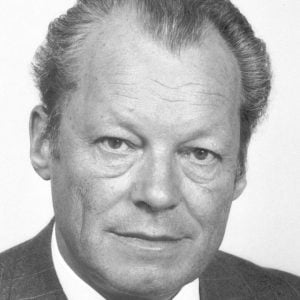Willy Brandt
Speed read
Willy Brand was awarded the Nobel Peace Prize for his work to achieve reconciliation between West Germany and the countries of Eastern Europe.

Full name: Willy Brandt
Born: 18 December 1913, Lübeck, Germany
Died: 8 October 1992, Unkel, Germany
Date awarded: 21 October 1971
European bridge-builder
A socialist, Willy Brandt started to take part in illegal anti-Nazi activities in the early 1930s. Forced to leave Germany, he moved to Norway, becoming politically active in the Norwegian Labour Party. When Germany attacked Norway in 1940, he fled to Sweden, where he worked as a journalist for the Norwegian government-in-exile. After the war, Brandt served as mayor of West Berlin, chairman of the Social Democratic Party (SPD) and Chancellor of Germany. Under Brandt’s leadership, West Germany signed a nuclear non-proliferation treaty. He also negotiated a non-aggression pact with the Soviet Union and a treaty with Poland, in which West Germany recognised the new East European borders established in 1945. These agreements helped to reduce tensions between East and West during the Cold War.
”We can see for ourselves that Willy Brandt’s policy of peace has brought thaw to the cold political climate, and this instils hope for a new kind of peace for the frozen earth of Europe.”
Aase Lionæs, Presentation Speech, 10 December 1971.
Brandt as Nazi opponent
Brandt devoted great energy to helping German concentration camp prisoner Carl von Ossietzky. As a member of an international support group, Brandt worked diligently to gain the support of the Norwegian labour movement for Ossietzky’s case. He held discussions with the Labour Party leadership and influenced labour leader Martin Tranmæl, who sat on the Norwegian Nobel Committee. There is no doubt that Brandt deserves much of the credit for convincing the Labour Party’s executive board and parliamentary group to nominate Ossietzky for the Nobel Peace Prize.
Defender of West Berlin
As mayor of West Berlin from 1957 to 1966, Brandt achieved international stature. He distinguished himself as a vigorous defender of the city’s interests, when in 1958 he flatly rejected a Soviet proposal to make Berlin a demilitarised zone separate from the Federal Republic of Germany. From 1961 onward, Brandt became a rallying point for all those who protested the building of the Berlin Wall, which made Berlin into a democratic island in the midst of communist East Germany.
”More than anything else, the sight of Willy Brandt kneeling in Warsaw has become a symbol of his Ostpolitik, his will to achieve peace and reconciliation.”
Thorbjørn Jagland, Norwegian Minister of Foreign Affairs, 26 May 2000.
Praise and criticism of the peace prize to Brandt
The Nobel Peace Prize to Brandt was praised by state leaders in both East and West, but it was met with scepticism by the conservative opposition in West Germany. In Norway, the peace prize was drawn into the debate on the EEC. Many opponents of Norwegian EEC membership viewed the selection of Brandt as an attempt by the Norwegian Nobel Committee to strengthen the pro-membership side prior to the public referendum. The torchlight procession for Brandt on 10 December 1971 was thus boycotted by all the political youth organisations, except for the Young Conservatives.
German reunification a step toward European unification
Willy Brandt witnessed the fall of the Berlin Wall in 1989 and the reunification of Germany the following year. Just before his death in 1992, he commented on these historic events with these words: “People who are well disposed to me sometimes suggest that the day on which the Germans united in freedom must have represented the fulfillment of my political life. That line of thought falls too short and too narrow. What I would like to see is the day when all Europe is united.”
”My years in Norway have meant a great deal to me. I learnt to extract concepts such as freedom, justice and solidarity from the ivory tower, free them from a narrow context and place them in an overall social and international perspective.”
Willy Brandt, Speech at the Nobel Banquet, 10 December 1971.
Learn more
Willy Brandt was born in Lübeck, Germany, in December, 1913. He was educated in Lübeck and in Oslo after escaping Nazi persecution in Germany. After leaving Germany, he continued his work against Nazism through international cooperation and frequent visits to various European countries ...
Disclaimer: Every effort has been made by the publisher to credit organisations and individuals with regard to the supply of photographs. Please notify the publishers regarding corrections.
Nobel Prizes and laureates
Six prizes were awarded for achievements that have conferred the greatest benefit to humankind. The 14 laureates' work and discoveries range from quantum tunnelling to promoting democratic rights.
See them all presented here.
